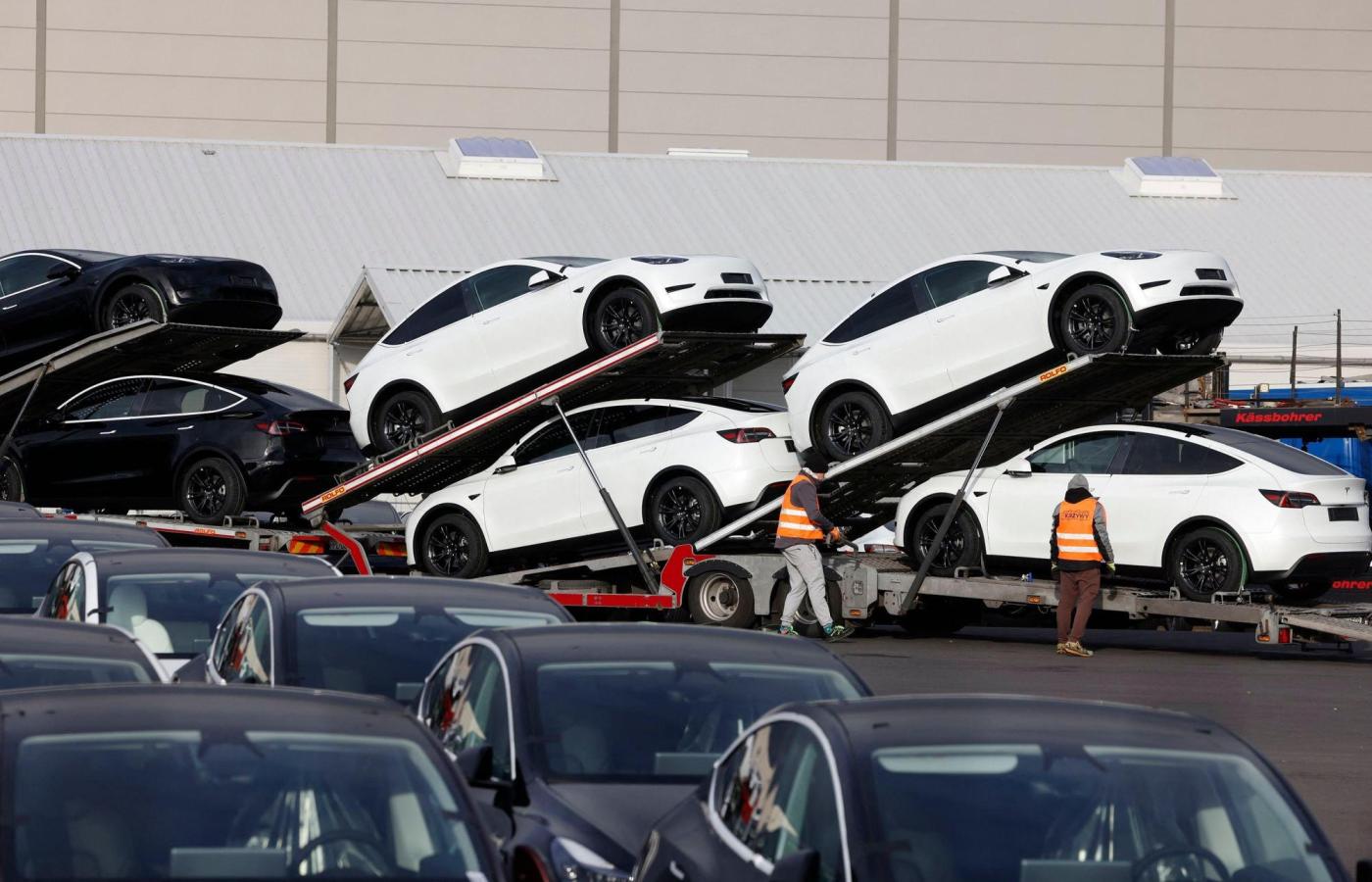By Chris Isidore | CNN
New York — Tesla sales are in an unprecedented slide. Competitors are rapidly gaining ground. There’s a lot of bad news for Tesla lately – but it’s unclear if the politics of its polarizing CEO, Elon Musk, are to blame.
What is known is that Tesla had its first-ever drop in global sales last year, as sales fell 1% from 2023. That wouldn’t be a huge decline for many other companies, but it is notable at a company that had recorded 38% and 40% increases in sales the previous two years – and with the massive growth in its share price over the past decade largely predicated on future growth.
RELATED: Waves of anti-Tesla and Elon Musk protests ripple throughout Bay Area
Related Articles
Waves of anti-Tesla and Elon Musk protests ripple throughout Bay Area
California’s first zero-emission car mandates are coming. Will targets be reached?
Tesla fined for alleged ‘serious’ failure to protect Fremont plant workers from excessive heat
Tesla Cybertruck owner says he’s been threatened and harassed soon after Musk endorsed Trump
Triple-fatal East Bay Cybertruck crash involved alcohol and cocaine, autopsies say
On a smaller time scale, Tesla did report a sharp drop 16% in US sales between December and January, but that is typical for the company, which seems to make a major push for year-end sales to hit its full-year financial results target, followed by a drop in January. Sales in January 2024, for instance, were off 24% from its December 2023 sales.
But Tesla is facing a lot more than a CEO whose eyes have not only been on the federal government, but at least four other companies he’s involved in. And that makes it hard to blame any one element definitively for the company’s relatively rough seas.
“It’s still too early to see any (Musk backlash) in the Tesla numbers,” said Stephanie Valdez Streaty, director of industry insights for Cox Automotive. “We can’t pinpoint that polarization is causing people to buy or avoid a Tesla.”
Musk has become the focus of much attention for his moves to reshape the federal government as he co-hosts Oval Office press conferences with President Donald Trump. And the headwinds for Tesla sales are real, from increased competition to the price of its cars.
Perhaps the biggest sign of shift in interest in owning a Telsa comes from S&P Global Mobility, which has sales data on a state-by-state basis. It broke the data into “blue states,” meaning states that voted for the Democratic candidate in the last four presidential elections, and “red states” where Republicans won four straight elections. And within each group of states, it looked at the percentage of household that already owned a Tesla that bought another one when purchasing a new car.
RELATED: Tesla sales decline in California with Model 3 plunging 36%
In the blue states, the percentage of repeat Tesla buyers fell, from 72% in the last quarter of 2023 to 65% in the last quarter of 2024. Meanwhile, repeat Tesla buyers in red states edged up very slightly from 47.6% at the end of 2023 to 48.2% during the last three months of last year.
The drop in loyalty rate for Tesla owners in blue states resulted in Tesla losing about 1 percentage point of market share overall in those states, which includes some of the nation’s biggest car markets, such as California.
There’s some additional anecdotal evidence to suggest that some buyers may have been turned off by Musk’s political activism. Valdez Streaty points to polling of potential car buyers this month by Morning Consult that shows that nearly 32% of US buyers “would not consider” buying a Tesla. That’s up from 27% in a Morning Consult survey a year ago, and only 17% when it asked the question in in February 2021.
By comparison, only 16% of potential buyers were almost certain or very likely to look at a Tesla before buying in the most recent survey, a figure that hasn’t changed much over the last four years.
The rise in people who say they are crossing Tesla off their shopping list is not nearly as great as those now expressing a negative view of Musk. A January poll by Quinnipiac University found that 53% of voters disapprove of Musk playing a prominent role in the Trump administration, compared to 39% who approved. A poll in December 2022 by the university found 36% of voters had a positive opinion of Musk and 35% had a negative view.
More used Teslas for sale
One factor that could indicate a Tesla-based Musk backlash would be the number of used Teslas hitting the market, as owners dump their cars. And there are more Teslas being traded in currently, with an average of around 11,300 Teslas listed on Cox’s AutoTrader, a record, throughout the fourth quarter of last year, up 28% from the average of 8,800 a year earlier.
But even that has complicating factors – Cox said much of the flood of Teslas hitting used car lots is likely due to the post-pandemic surge in sales three years ago and the natural trend of some people trading in cars after three years.
And there are many other factors likely driving down new Tesla sales, most notably increased competition. Legacy Western automakers such as General Motors, Ford and Volkswagen have spent the past few years rolling out new models of electric vehicles, with more constantly on the way and sometimes with lower prices than Tesla.
By comparison, Tesla has made relatively modest changes to its main lineup – the Model Y and Model 3 sedans and Model X and Model Y SUVs. The one new model, the Cybertruck pickup, is an expensive niche vehicle that has had only modest sales.
There is also significant new competition from Chinese automaker BYD, which has nearly caught Tesla in worldwide EV sales and actually topped it by a large margin in the fourth quarter of 2024. BYD is taking market share away from Tesla in China and Europe but it has yet to enter the US market.
Tesla sales in Germany in January fell 59% compared to a year ago, according to the German Federal Motor Transport Authority. And just as Musk has been a key supporter of Trump, he has become a high profile supporter of the far-right Alternative for Germany (AfD) party.
Car purchases are among the largest and most carefully thought out purchases that consumers make other than housing. And they generally look primarily at price, options and perceived value more than factors such as the politics of the CEO, said Ivan Drury, director of insights at car-buying site Edmunds.
“There’s a huge swath of the populaton that doesn’t care about politics or it’s not top of mind,” said Drury. “A lot of people will put aside their feelings about politics when making a purchase like this and focus on price.”
The-CNN-Wire
& © 2025 Cable News Network, Inc., a Warner Bros. Discovery Company. All rights reserved.












